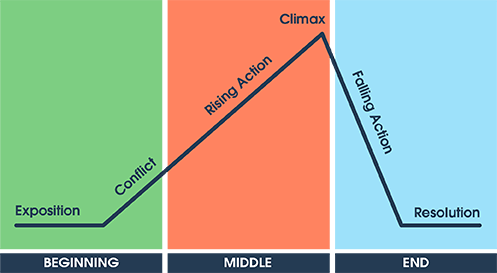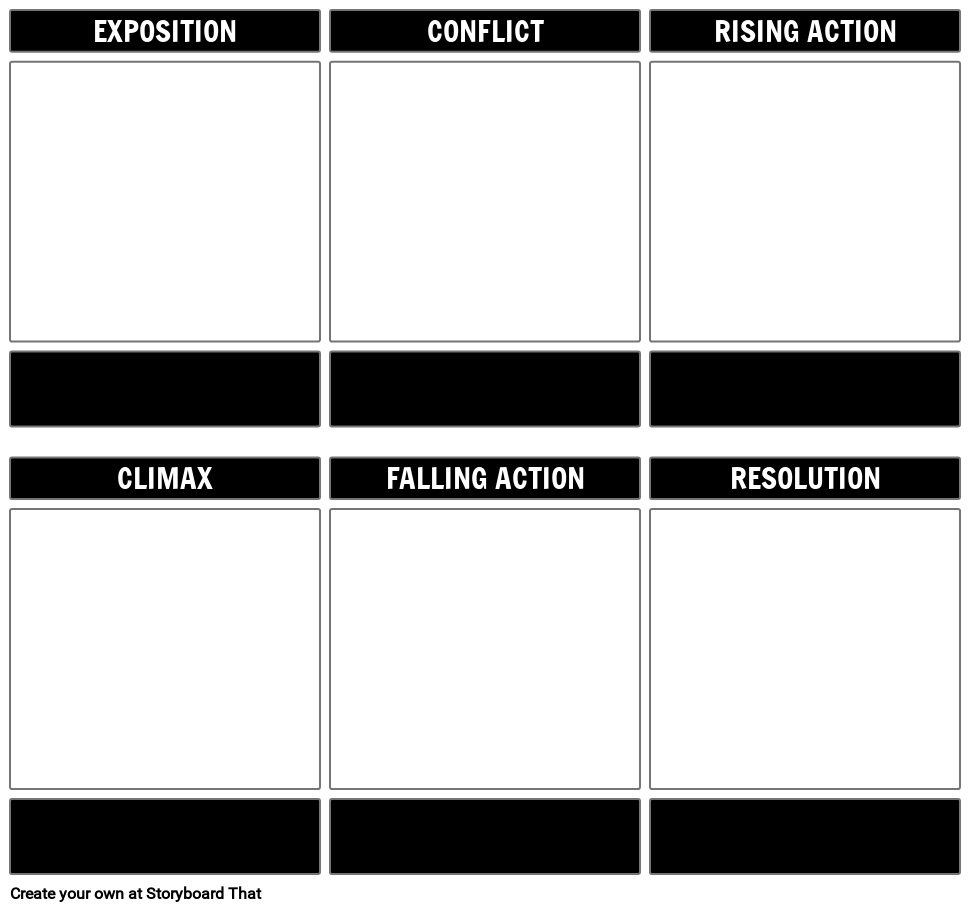Lesson Plan Overview
A common use for Storyboard That is to help students create a plot diagram of the events from a story. Not only is this a great way to teach the parts of the plot, but it reinforces major events and helps students develop greater understanding of literary structures.
Students can create a storyboard capturing the narrative arc in a work with a six-cell storyboard containing the major parts of the plot diagram. For each cell, have students create a scene that follows the story in sequence using: Exposition, Conflict, Rising Action, Climax, Falling Action, and Resolution.
Theseus and the Minotaur Plot Diagram Example
Exposition
Theseus is born to Aethra and Aegeus. His father leaves his sword and sandals under a rock for Theseus to find when he is older.
Conflict
After retrieving his father's sword, Theseus goes to Athens where the Marathon Bull kills a visiting prince from Crete. [Some versions say Androgeus was assassinated by jealous rivals because he was successful in the Olympic Games.] Athens and Crete go to war. Crete is victorious.
Rising Action
An oracle tells Athens to satisfy Minos' demands: Athens must submit fourteen young people every nine years to Knossos. Theseus volunteers as tribute to Crete, as one of the seven youths and seven maidens that Minos requires.
Climax
Ariadne, a princess in Crete, falls in love with Theseus. With the help of Daedalus, she tells Theseus to use a spool of thread to find his way. Theseus enters the labyrinth.
Falling Action
Theseus defeats the Minotaur and escapes.
Resolution
Though Theseus won the day, tragedy strikes. Theseus forgot to change the sails from black to white. His father jumped off the cliff into the ocean from grief, thinking the mission had not been successful.
Template and Class Instructions
(These instructions are completely customizable. After clicking "Copy Activity", update the instructions on the Edit Tab of the assignment.)
Student Instructions
Create a visual plot diagram of the myth of Theseus and the Minotaur.
- Separate the story into the Exposition, Conflict, Rising Action, Climax, Falling Action, and Resolution.
- Create an image that represents an important moment or set of events for each of the story components.
- Write a description of each of the steps in the plot diagram.
Lesson Plan Reference
Student Rubric
(You can also create your own on Quick Rubric.)
| Proficient 25 Points | Emerging 21 Points | Beginning 17 Points | Try Again 13 Points | |
|---|---|---|---|---|
| Descriptive and Visual Elements | Cells have many descriptive elements, and provide the reader with a vivid representation. | Cells have many descriptive elements, but flow of cells may have been hard to understand. | Cells have few descriptive elements, or have visuals that make the work confusing. | Cells have few or no descriptive elements. |
| Grammar/Spelling | Textables have three or fewer spelling/grammar errors. | Textables have four or fewer spelling/grammar errors. | Textables have five or fewer spelling/grammar errors. | Textables have six or more spelling/grammar errors. |
| Evidence of Effort | Work is well written and carefully thought out. Student has done both peer and teacher editing. | Work is well written and carefully thought out. Student has either teacher or peer editing, but not both. | Student has done neither peer, nor teacher editing. | Work shows no evidence of any effort. |
| Plot | All parts of the plot are included in the diagram. | All parts of the plot are included in the diagram, but one or more is confusing. | Parts of the plot are missing from the diagram, and/or some aspects of the diagram make the plot difficult to follow. | Almost all of the parts of the plot are missing from the diagram, and/or some aspects of the diagram make the plot very difficult to follow. |
Lesson Plan Overview
A common use for Storyboard That is to help students create a plot diagram of the events from a story. Not only is this a great way to teach the parts of the plot, but it reinforces major events and helps students develop greater understanding of literary structures.
Students can create a storyboard capturing the narrative arc in a work with a six-cell storyboard containing the major parts of the plot diagram. For each cell, have students create a scene that follows the story in sequence using: Exposition, Conflict, Rising Action, Climax, Falling Action, and Resolution.
Theseus and the Minotaur Plot Diagram Example
Exposition
Theseus is born to Aethra and Aegeus. His father leaves his sword and sandals under a rock for Theseus to find when he is older.
Conflict
After retrieving his father's sword, Theseus goes to Athens where the Marathon Bull kills a visiting prince from Crete. [Some versions say Androgeus was assassinated by jealous rivals because he was successful in the Olympic Games.] Athens and Crete go to war. Crete is victorious.
Rising Action
An oracle tells Athens to satisfy Minos' demands: Athens must submit fourteen young people every nine years to Knossos. Theseus volunteers as tribute to Crete, as one of the seven youths and seven maidens that Minos requires.
Climax
Ariadne, a princess in Crete, falls in love with Theseus. With the help of Daedalus, she tells Theseus to use a spool of thread to find his way. Theseus enters the labyrinth.
Falling Action
Theseus defeats the Minotaur and escapes.
Resolution
Though Theseus won the day, tragedy strikes. Theseus forgot to change the sails from black to white. His father jumped off the cliff into the ocean from grief, thinking the mission had not been successful.
Template and Class Instructions
(These instructions are completely customizable. After clicking "Copy Activity", update the instructions on the Edit Tab of the assignment.)
Student Instructions
Create a visual plot diagram of the myth of Theseus and the Minotaur.
- Separate the story into the Exposition, Conflict, Rising Action, Climax, Falling Action, and Resolution.
- Create an image that represents an important moment or set of events for each of the story components.
- Write a description of each of the steps in the plot diagram.
Lesson Plan Reference
Student Rubric
(You can also create your own on Quick Rubric.)
| Proficient 25 Points | Emerging 21 Points | Beginning 17 Points | Try Again 13 Points | |
|---|---|---|---|---|
| Descriptive and Visual Elements | Cells have many descriptive elements, and provide the reader with a vivid representation. | Cells have many descriptive elements, but flow of cells may have been hard to understand. | Cells have few descriptive elements, or have visuals that make the work confusing. | Cells have few or no descriptive elements. |
| Grammar/Spelling | Textables have three or fewer spelling/grammar errors. | Textables have four or fewer spelling/grammar errors. | Textables have five or fewer spelling/grammar errors. | Textables have six or more spelling/grammar errors. |
| Evidence of Effort | Work is well written and carefully thought out. Student has done both peer and teacher editing. | Work is well written and carefully thought out. Student has either teacher or peer editing, but not both. | Student has done neither peer, nor teacher editing. | Work shows no evidence of any effort. |
| Plot | All parts of the plot are included in the diagram. | All parts of the plot are included in the diagram, but one or more is confusing. | Parts of the plot are missing from the diagram, and/or some aspects of the diagram make the plot difficult to follow. | Almost all of the parts of the plot are missing from the diagram, and/or some aspects of the diagram make the plot very difficult to follow. |
How Tos about Theseus and the Minotaur Myth
Incorporate Creative Writing Prompts with Plot Diagrams
Boost student engagement by adding creative writing prompts alongside each stage of the plot diagram. Encourage students to imagine alternative events, character motivations, or endings to deepen their understanding of the story structure and spark original thinking.
Model a Sample Plot Diagram for the Class
Show students how to break down a story by creating a sample plot diagram together. Walk through each narrative stage so students can see exactly what is expected before working independently.
Facilitate Peer Review of Storyboard Projects
Pair students to exchange and review each other's plot diagrams. Guide them to provide positive feedback and constructive suggestions to help their peers recognize strengths and identify areas for improvement.
Connect Plot Diagrams to Other Myths or Stories
Invite students to compare the plot structure of Theseus and the Minotaur with a different myth or story. Highlight similarities and differences to reinforce understanding of narrative elements across genres.
Display Student Plot Diagrams for Class Discussion
Showcase finished storyboards on a bulletin board or digital platform. Use them as a springboard for whole-class discussion to celebrate creativity and analyze key story moments together.
Frequently Asked Questions about Theseus and the Minotaur Myth
What is a plot diagram for Theseus and the Minotaur?
A plot diagram for Theseus and the Minotaur visually outlines the story's key events: Exposition (Theseus's origins), Conflict (the Minotaur and tribute), Rising Action (Theseus volunteers), Climax (entering the labyrinth), Falling Action (defeating the Minotaur), and Resolution (his father's tragic end). It helps students understand literary structure.
How can students create a storyboard for the Theseus and the Minotaur myth?
Students can create a storyboard by dividing the myth into six parts—Exposition, Conflict, Rising Action, Climax, Falling Action, and Resolution—then illustrating and describing each scene. Using tools like Storyboard That makes this activity interactive and easy to follow.
What are the major events in the Theseus and the Minotaur story?
The major events include: Theseus discovering his heritage, Athens losing to Crete, Theseus volunteering as tribute, receiving help from Ariadne, defeating the Minotaur, and the tragic return home. Each event fits a part of the plot diagram.
Why is using a plot diagram helpful when teaching Greek myths?
Using a plot diagram helps students break down complex Greek myths, making it easier to identify key events, understand the narrative structure, and retain essential details. It’s especially effective for visual learners in grades 6–12.
What are some tips for teaching the Theseus and the Minotaur myth in middle and high school?
Effective tips include: using visual storyboards, encouraging group discussion of each plot part, comparing this myth to others, and assigning creative projects like rewriting the ending. These strategies make the lesson engaging and memorable for students.
More Storyboard That Activities
Greek Mythology: Theseus
Testimonials

“By using the product, they were so excited and they learned so much...”–K-5 Librarian and Instructinal Technology Teacher

“I'm doing a Napoleon timeline and I'm having [students] determine whether or not Napoleon was a good guy or a bad guy or somewhere in between.”–History and Special Ed Teacher

“Students get to be creative with Storyboard That and there's so many visuals for them to pick from... It makes it really accessible for all students in the class.”–Third Grade Teacher
© 2026 - Clever Prototypes, LLC - All rights reserved.
StoryboardThat is a trademark of Clever Prototypes, LLC, and Registered in U.S. Patent and Trademark Office






